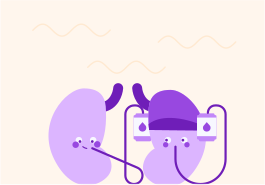YOU ARE LEARNING:
Water Regulation

Water Regulation
The level of water in the body is carefully balanced by homeostatic measures in the kidneys.
The right conditions in the body need to be maintained so everything works properly. These conditions include, our body temperature, blood glucose concentration and our water content. What is the word we use to refer to this ability to keep conditions stable?

It is really important that you have enough water in your body. It is also really important that you don't have too much. Which organ do you think removes excess water from your body?

Water enters and leaves the body during different processes. How do you make sure your body gets the water it needs?

Excess water is controlled and removed by the kidneys, but water also leaves the body in other ways that cannot be controlled. Select the two other ways water can leave the body.

You can select multiple answers
Water enters our body when we consume fluids and food. It leaves our body in a number of different ways: When we exhale, when we sweat (which also removes urea and ions) and when we urinate.
It is the kidneys that control the water content of our blood and turns excess water into urine.
Water is transported around your body in your blood. The amount of water is carefully controlled to protect our cells. What do you think would happen to your cells if too much water entered them?

Name the layer of the animal cell that breaks if the cell bursts.

Animal cells carry out important processes such as respiration. The water content in our blood is regulated to protect cells and allow them to function.
Water that is carried in the blood can move from the blood into body cells. It moves from a higher concentration to a lower concentration across the cell membrane. What do we call the process where water diffuses across a semipermeable membrane?

Water can also move by osmosis from body cells into the blood, if the concentration of water in the blood is too low. What do you think will be the effect on the cells?

So it is the water content in the blood the body regulates. Water content in the cells is a result of water content in the blood. If water content in the blood is too high, more water moves into the cells via osmosis and cells might burst! If water content in the blood is too low, water will leave cells and they will shrink.
